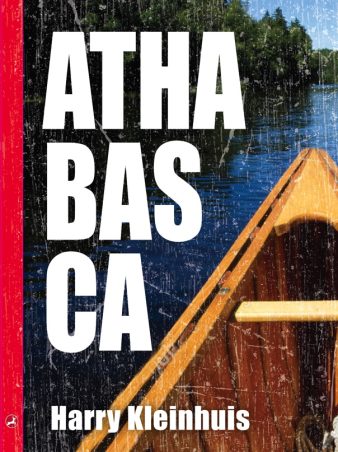Athabasca

Author: Harry Kleinhuis
Publisher: Red Deer Press
Jack is 14 going on 15. For the past seven years, he and his younger brother and sister, and his mother and father, have lived in a remote cabin on the Athabasca River west of Edmonton. It's the late 1930s, and the river is almost as wild and untamed as it was before humans began settling along the riverbanks.
The reason for the Whyte family living there has a good deal to do with Malcolm, Jack's father, and what we would call his PTSD after serving in World War One. He has never really recovered from the trauma of his experience in the trenches, and his solution has been to sweep his family into the wilderness and remain there, living off the land. But now Jack is of an age when he figures he has had enough of this life, particularly since his father is not the most understanding of parents.
Trouble is, as Jack makes his move to leave the family by canoeing away down the Athabasca, something goes wrong on the first day and he breaks his arm, and has to stay stranded, alone, unable to make any more progress. Malcolm comes after him, and somehow father and son begin to communicate in ways they never have. All of this is played out against the backdrop of a powerful river where nature is dominant and where a family manages their lives alone in the bush, with little or no reference to the world beyond.
There’s no question that the author of this novel knows about living, hunting and paddling in the Canadian wilderness, and there’s admirable authenticity in every scene of the book. It’s well paced and exciting, from the characters surviving overturned canoes in a flash flood to a narrow escape from wolves.
There’s also historical perspective, given that it takes place in the late 1930s, after the Depression drove the family to a remote location where they barely survive the day-to-day challenges. By the end, the shadow of World War II is already looming.
But even beyond the day-to-day trapping, hunting, fishing, firewood chopping and other grueling chores, the three children have to put up with an authoritarian father who suffers from shell shock, or post-traumatic stress disorder, as a result of serving in the trenches and losing most of his fellow combat mates.
Jack feels it’s time to break loose from his hard life, which involves no social outlets and a father who rarely speaks, let alone shows love. Unfortunately, he’s barely down the river when he has an accident that requires a rescue – by his father. The family is reunited but changed, with a new goal of leaving the wilderness together.
The main problem with this novel is that Jack doesn’t seem like the dominant character after the first few chapters. The third-person point of view shifts continually from Jack to his father, and to a lesser extent his mother, younger brother and sister. It begins to feel like Jack is a prop for a story about his father, and yet one can’t help but care about each of the characters, applaud their changes and root for them through their difficulties. The writing is a little lackluster but still flows, and the hopeful ending is welcome. Again, anyone who loves wilderness survival tales will enjoy this, but only if their expectations are for a novel about a family that includes a 14-year-old boy, not one focused heavily on the boy himself.
no-repeat;left top;; auto 0px 0px 0px 0px
